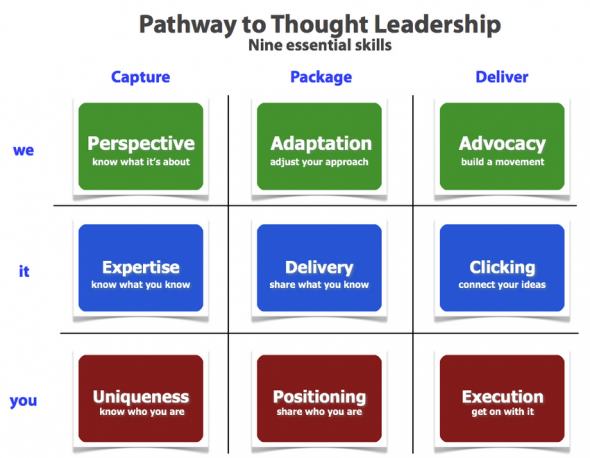Thought Leaders are those people who possess a distinctively original idea, a unique point of view, or an unprecedented insight into their industry.” pg. 14
A special leadership style, the Thought Leader leads as an expert, able to use foresight to build new ideas, create social venture projects and ultimately use them to better communities and provide market solutions.
This book, Thought Leaders, provides the nine essential skills to Thought Leadership, offering tips for better mastering the skills, ideas of strengthening them, and examples of how they may relate to your particular style and situation.

Uniqueness [know who you are]
Find your personal brand and own it. Discover what sets you apart by finding how you’re wrong, and articulating how to turn those negatives into positives. Your signature “is an expression of you, rather than an affectation of who you’d like to be.” pg. 52. Stand out, don’t bother fitting in.
Expertise [know what you know]
Craft ideas to achieve clarity, flexibility and integrity. When delivering ideas, cover the spectrum to intrigue left- and right-brainers. Thought Leaders are experts because “of their ability to capture their expertise and share it with others” pg. 61. Use metaphors and attribute your influencers to give yourself credibility.
Perspective [see what is really going on]
Develop foresight and look beyond the trends with a more futuristic viewpoint. Be aware of your environment and having a sensitivity to sociological technological, economic, environmental and political factors– The key is to listen like a leader.

Positioning [share who you are]
Be flexible, and identify the best focus/angle each time giving your elevator pitch. The three focus levels are yourself, what you do, and the outcomes. What’s the energy level required?
Delivery [share what you know]
Tell a story, show an idea, ask a question. There are six skills to focus on when delivering a message, being a speaker, author, trainer, mentor, facilitator or coach. What’s your goal, role and audience?
Adaptation [adjust how you share your ideas]
How do you learn best? Visually? Spoken? Kinesthetically? Numerically? Abstractly? Assume with any given audience, you have one of every learner listening and speak to each style.
Execution [get on with it]
The more disciplined you are, then smarter you’ll work. “Stay on the ball by committing to more and then meeting the commitments.” pg. 162
Clicking [connect your ideas]
“A great idea that only you like is not that great” pg. 167. Convince other people you’re idea is really the best by addressing spoken, and unspoken problems with the idea and execution. In doing so, you’ll ultimately give you, and your idea, value.
Advocacy [build a movement]
Challenge your blessings in the beginning, so when the ease starts to plateau, you can advance to supernova instead of crashing to burn. Get people talking about you and collaborate with others to build advocacy within the organization.
Enterprise your business and market your advantages. If you have the Thought Leadership developmental strategy, you’ll be able to market to your advantage.
Thought Leaders
Matt Church, Scott Stein and Michael Henderson
ISBN 978 1 86950 913 2
HarpinCollins Publishers, Auckland 2011
